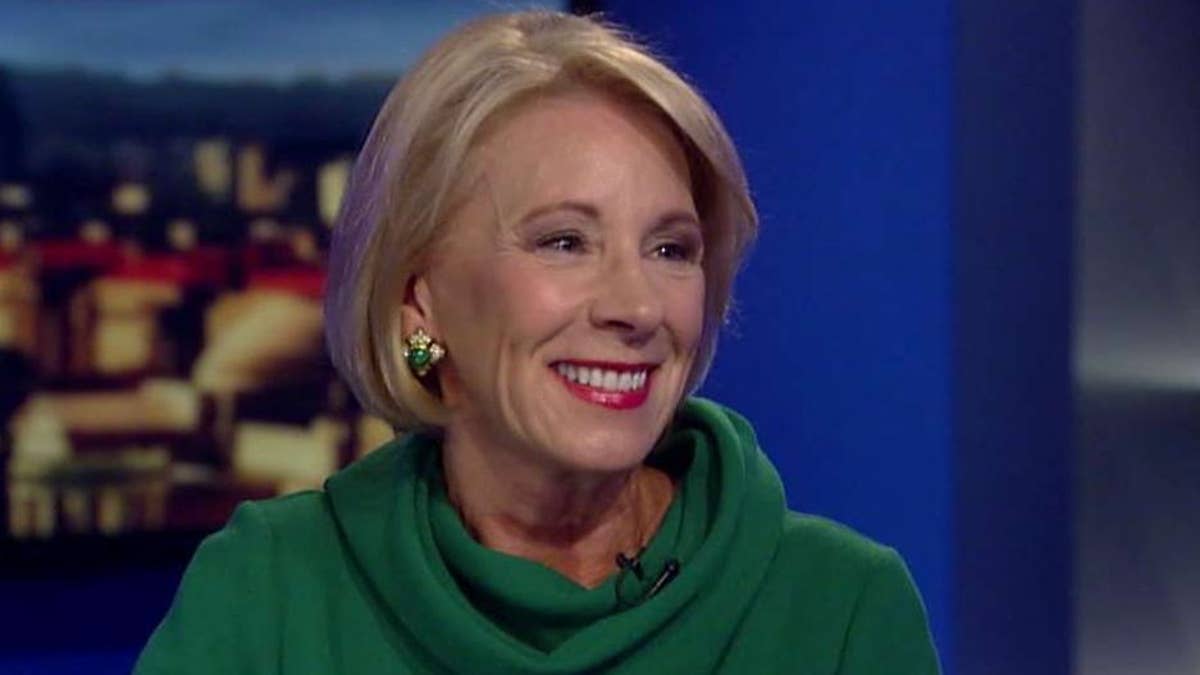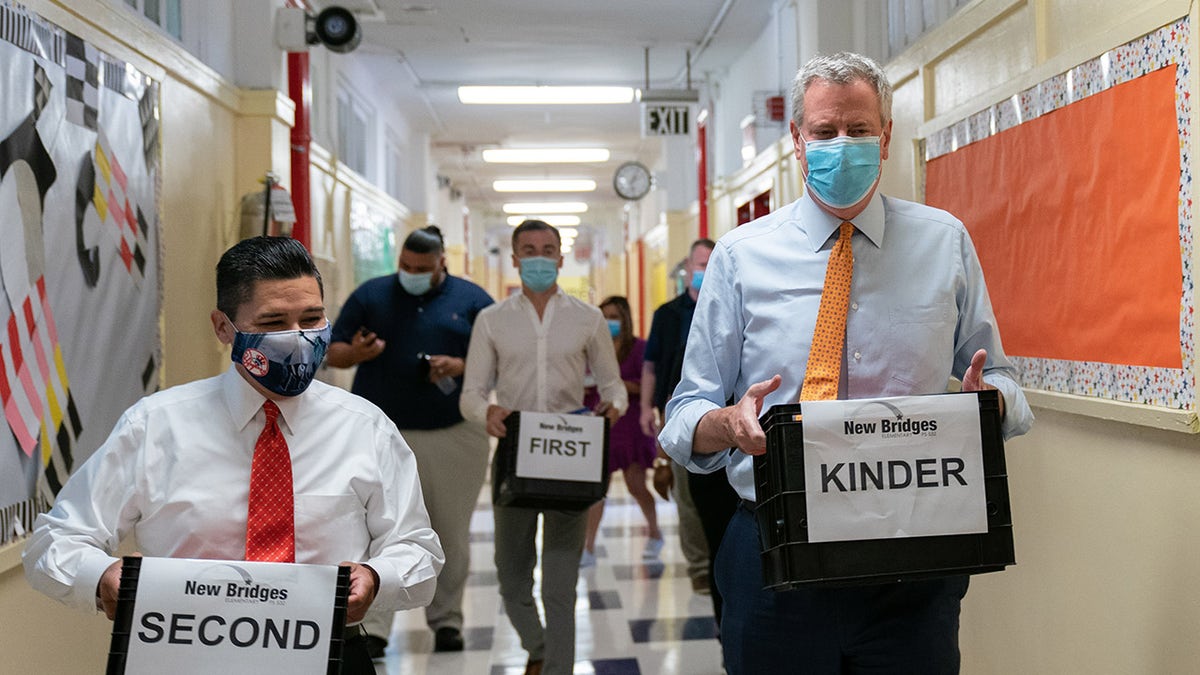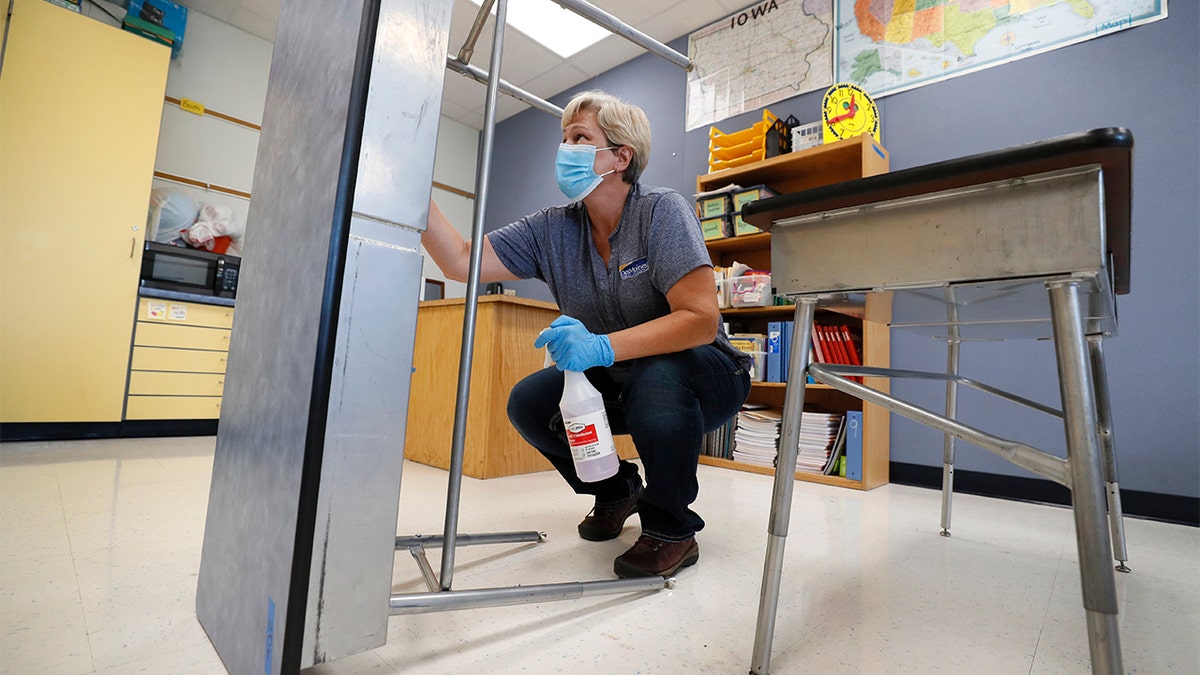Betsy DeVos shares her concerns about schools failing to reopen for in-person learning
Education Secretary Betsy DeVos shared her concerns about schools failing to reopen for in-person learning this fall during the coronavirus pandemic.
Education Secretary Betsy DeVos called for Congress to pass coronavirus relief legislation with funding for school choice, warning that more private schools are on the brink of closing without federal help.
"We need to have immediate relief for those schools," DeVos told Fox News in an interview. "Think about the impact of all of these kids who suddenly now are showing up at the traditional public school door because they no longer have this other option. That's a crisis in the making right there."
Her comments come as at least 160 private schools have permanently closed so far this year as a result of economic fallout of the coronavirus pandemic, and a recent court ruling against DeVos has limited relief fund access to private schools.
Meanwhile, public schools, which are largely funded by state and local governments, are facing financial hardships and teacher layoffs because tax revenue has dried up due to the economic crisis and Congress hasn't passed a comprehensive aid package to help replenish those funds.
Senate Republicans included major school choice provisions in their latest $300 billion coronavirus relief bill but no new aid to state and local governments. The effort failed to get the 60 votes necessary to advance this month because of unanimous opposition from Democrats .

Education Secretary Betsy DeVos is concerned about the wave of private school closings during the coronavirus pandemic.
DeVos cited the wave of school closings, mostly from Catholic schools, in an interview with Fox News in explaining how the coronavirus school choice provisions could stop the dire financial straits for certain faith-based schools.
"It would have an immediate impact, first of all, for those kids in those schools that are at risk of closing," DeVos said.
"If they don't get additional resources or students able to enroll and bring the tuition, there are more that are at risk of closing."
The biggest wave of school closures has come from Catholic schools with 128 already closing permanently largely due to the economic crisis caused by the pandemic, according to the National Catholic Education Association.
SENATE GOP'S LATEST CORONAVIRUS LEGISLATION INCLUDES KEY SCHOOL-CHOICE PROVISIONS
"The biggest problem is parents' ability to pay tuition and can they continue to pay tuition as the year goes on," Sister Dale McDonald, the association's director of public policy and education research, told Fox News. "That's a huge piece that we're trying to look at with no real certainty about what it's going to look like -- particularly if this thing rears its head again in a more concerted effort in the next couple of months."
The school choice legislation could have helped schools "on the brink" of closure, McDonald said.
Some Catholic schools have picked up new enrollment during the pandemic from public schools that have not yet reopened for in-person learning. But the concern is that schools will lose enrollment mid-year if public schools fully reopen and parents can't afford to pay tuition.
Unlike public schools, private Catholic schools had access to the Paycheck Protection Program (PPP) that was designed to help small businesses stay afloat with forgivable loans during the pandemic.
JUDGE RULES DEVOS PLAN TO GIVE MORE CORONAVIRUS RELIEF TO PRIVATE SCHOOLS IS ILLEGAL
"Our biggest worry is that come November and December, there's no money for payroll and there's no Payroll Protection Program coming forward to help us out this time," McDonald said.
In 2019, there were nearly 1.8 million kids enrolled in 6,289 Catholic schools nationwide. That's down dramatically from a peak in the 1960s, when there were about 5.25 million students enrolled in 12,893 schools, McDonald said.

Richard Carranza, chancellor of the New York City Department of Education, left, and Bill de Blasio, mayor of New York, carry bins with supplies during a news conference at New Bridges Elementary School in the Brooklyn borough of New York, U.S., on Wednesday, Aug. 19, 2020. Photographer: Jeenah Moon/Bloomberg via Getty Images
Independent schools, which are not governed by local religious organizations and run by a board of trustees with charitable endowments, have fared better during the pandemic. Just three have closed out of about 1,600 schools nationwide, according to Myra McGovern, Vice President of Media at the National Association of Independent Schools (NAIS).
A NAIS survey of member schools shows most have created an emergency grant fund to provide tuition assistance to school families affected by the pandemic and more than a third have increased their financial aid budgets.
Leaders at the private schools say they are largely open for in-person learning at least part-time and can offer alternatives to parents whose public schools are remote-only.

FILE - In this July 8, 2020, file photo, Des Moines Public Schools custodian Cynthia Adams cleans a desk in a classroom at Brubaker Elementary School in Des Moines, Iowa. An aggressive push by Iowa’s staunchly pro-Trump governor to reopen schools amid a worsening coronavirus outbreak has descended into chaos, with some districts and teachers rebelling and experts questioning the scientific benchmarks being used by the state to make decisions. (AP Photo/Charlie Neibergall, File)
The Association of Christian Schools International (ACSI) is the largest Protestant school association with just under 2,200 schools in the U.S. with about 450,000 students. At least 29 Christian schools have closed and others are on the verge.
BILL DE BLASIO ‘VERY CONFIDENT’ IN REVISED NYC SCHOOL REOPENING TIMELINE
"As in every sector of the economy, Christian schools are dealing with the challenges presented by the response to COVID," ACSI said in a statement to Fox News. "Yes, some are experiencing difficulties, but many are also meeting those challenges. We estimate that more than two dozen member schools (29 at last count) will have closed due to COVID and another two dozen were in jeopardy."
ACSI also says Congress can help by passing the school choice provisions that would give families scholarships to attend private schools.
The Senate's $300 billion "skinny" legislation contained provisions from the DeVos-backed School Choice Now Act that Sen. Tim Scott, R-S.C., authored. It included the creation of a federal education tax credit worth $5 billion annually to help students attend private schools.
DeVos and President Trump have pushed for all schools to reopen this fall for in-person learning. But some schools and districts have not yet, including New York City, the largest district in the country, due to staffing and supply shortages.
The nation's top education administrator said she's worried that schools are being "very unevenly reopened" and this will hurt the most vulnerable students.
CLICK HERE TO GET THE FOX NEWS APP
"We know that many of the major urban areas have not reopened in person," DeVos said. "And my greatest fear is for the kids who are the most vulnerable -- for the ones whose parents don't have the financial resources to do something different. They're the ones who always get the short end of the straw."
"That is not right," DeVos continued. "It is unjust, and it's something that I have been fighting for more than 30 years, which is exactly why we need to give the parents the resources ... [to] decide what is best for them and their kids."











































